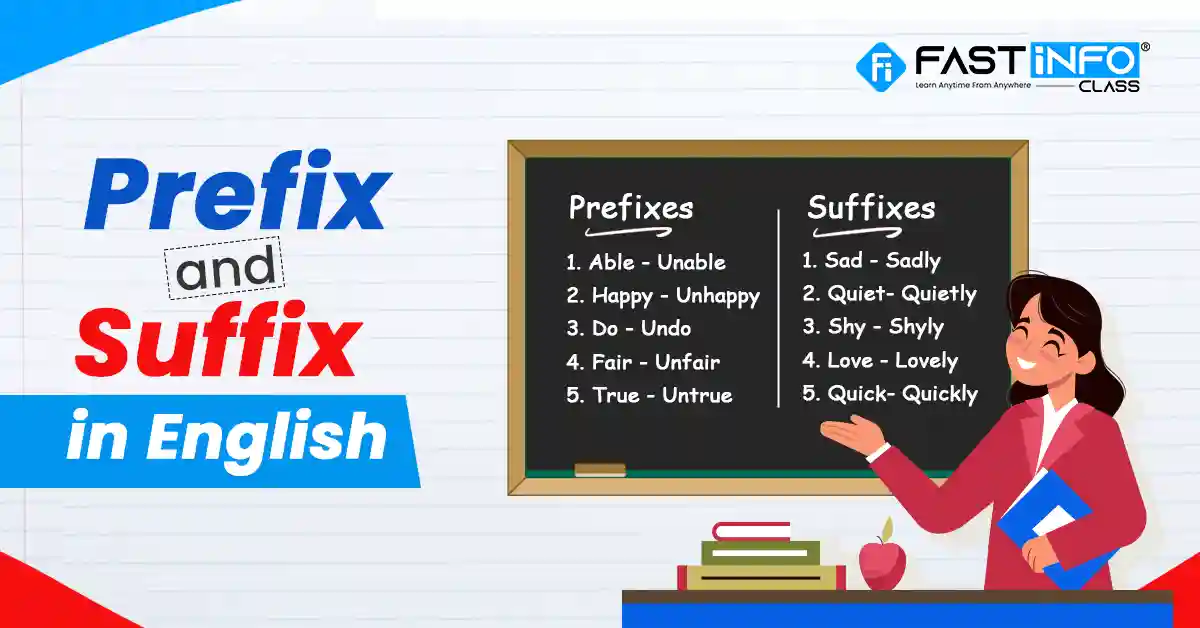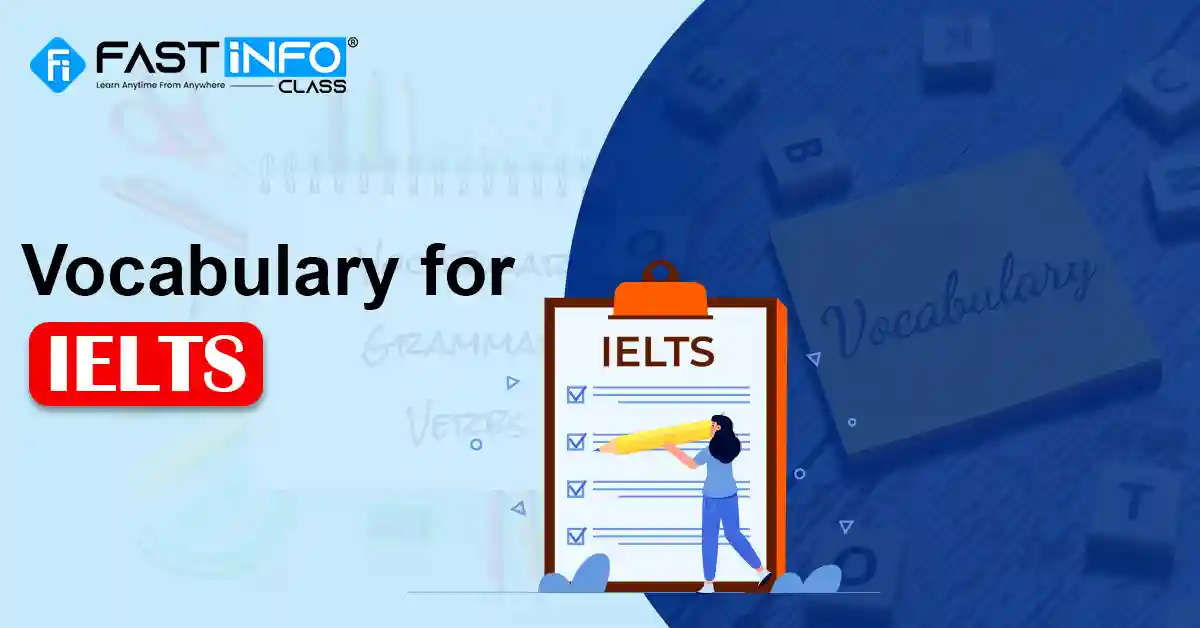Self Introduction in English for Job Interviews: A Guide
29 Dec, 2025
Welcome Offer for First Time Customers Get 15% off USE CODE: NEW15 AT CHECKOUT

Welcome Offer for First Time Customers Get 15% off USE CODE: NEW15 AT CHECKOUT

Welcome Offer for First Time Customers Get 15% off USE CODE: NEW15 AT CHECKOUT

Welcome Offer for First Time Customers Get 15% off USE CODE: NEW15 AT CHECKOUT

Welcome Offer for First Time Customers Get 15% off USE CODE: NEW15 AT CHECKOUT

Welcome Offer for First Time Customers Get 15% off USE CODE: NEW15 AT CHECKOUT

Welcome Offer for First Time Customers Get 15% off USE CODE: NEW15 AT CHECKOUT

Welcome Offer for First Time Customers Get 15% off USE CODE: NEW15 AT CHECKOUT


 By FastInfo Class
Published On 22 Jul 2025
Category Learn English Online
By FastInfo Class
Published On 22 Jul 2025
Category Learn English Online
Prefixes and suffixes are word parts added to the beginning or end of a root word to create new meanings. They play a key role in building vocabulary and understanding word structure. This basic concept is often introduced early in structured English learning to help learners grasp grammar more easily and use language more confidently. In this blog, you will learn how to use prefixes and suffixes in English like a pro.
A prefix is a group of letters added to the beginning of a word to change its meaning. It cannot stand alone and always modifies the original word to form a new one.
A suffix is a group of letters added to the end of a word to change its form or function. It often modifies the word’s tense, type, or meaning, turning it into a noun, adjective, adverb, or verb. A suffix cannot stand alone—it always attaches to a root word.
The common prefixes used in English are listed below:
| Prefix | Meaning | Example | Meaning of New Word |
|---|---|---|---|
| Un- | Not | Unfair | Not fair |
| Re- | Again | Rebuild | Build again |
| Dis- | Opposite of | Disagree | Not agree |
| Pre- | Before | Prepaid | Paid before |
| Mis- | Wrongly | Misplace | Place wrongly |
| In- | Not | Invisible | Not visible |
| Im- | Not | Impolite | Not polite |
| Over- | Too much | Overreact | React too much |
| Under- | Too little | Underestimate | Estimate too low |
| Inter- | Between | Interview | View between two parties |
The common suffixes used in English are listed below:
| Suffix | Function | Example | Meaning/Use |
|---|---|---|---|
| -ful | Full of | Hopeful | Full of hope |
| -less | Without | Hopeless | Without hope |
| -ness | State/quality | Kindness | Quality of being kind |
| -ly | Manner | Quickly | In a quick manner |
| -ment | Action/result | Movement | Act of moving |
| -tion | State/process | Creation | Process of creating |
| -able | Capable of | Readable | Capable of being read |
| -er | One who | Teacher | One who teaches |
| -ing | Action | Running | Act of running |
| -ed | Past tense | Watched | Action completed in the past |
Understanding prefixes and suffixes in English plays a crucial role in strengthening your command over the language. Here are five well-defined benefits of learning them:
Mastering a set of commonly used prefixes and suffixes makes it easier to form new words. This naturally increases your vocabulary without depending on rote memorisation.
Recognising how prefixes and suffixes alter the meaning of a root word helps in understanding new words instantly. This builds faster reading and listening comprehension.
Using words accurately becomes easier when you understand their structure. This results in clearer, more confident speech and writing across academic, professional, and everyday contexts.
Knowing how affixes work improves sentence construction and reduces common spelling mistakes. It also supports the correct usage of word forms in grammar.
Exams like SSC, Bank PO, and IELTS frequently test word formation. A strong grip on prefixes and suffixes offers a distinct edge in scoring higher with minimal effort.
While prefixes and suffixes are easy to apply, a few basic rules help avoid common spelling mistakes. Here are the most important ones every learner should follow:
When adding a prefix, the spelling of the original word remains unchanged. The prefix simply attaches to the beginning.
Example:
If a word ends in a silent ‘e’, and the suffix begins with a vowel, the ‘e’ is dropped.
Example:
However, if the suffix begins with a consonant, the ‘e’ is usually kept.
When a word ends in ‘y’ preceded by a consonant, change ‘y’ to ‘i’ before adding most suffixes (except those starting with i like -ing).
Example:
But:
If a one-syllable word ends in consonant-vowel-consonant (CVC) and the final syllable is stressed, double the consonant before adding a vowel-starting suffix.
Example:
Strengthen what you’ve learned with this quick activity. Select the correct option or fill in the blanks to test your understanding.
1. Choose the correct prefix to complete the word:
_____agree
A. dis-
B. re-
C. un-
Correct Answer: A. Disagree
2. What is the correct suffix for this sentence?
She is a very help____ person.
A. -ing
B. -ful
C. -ness
Correct Answer: B. helpful
3. Fill in the blank with the correct form using a suffix:
He worked hard to achieve great ______ in life.
Answer: __________________
Correct Answer: success + -ful = success → success → success → success → successfulness or success → successful
4. Which of the following words has a suffix that means “the act of”?
A. movement
B. unhappy
C. disown
Correct Answer: A. movement (-ment means “the act of”)
5. What happens when you add “-ing” to the word “make”?
A. made
B. making
C. making
Correct Answer: B. making (silent ‘e’ is dropped).
Conclusion
To sum up, mastering prefixes and suffixes in English lays the foundation for strong language skills. It empowers learners to understand, form, and apply words with clarity and precision across various contexts.
While the concept is simple, the right training turns it into a lasting strength. FastInfo Class delivers this edge through expert-led sessions, structured practice, and a results-driven Spoken English program tailored for real-world fluency.
A prefix is added at the beginning of a word to change its meaning, while a suffix is added at the end to change the word’s form or function.
Yes. A single word can contain both a prefix and a suffix. For example, unhappiness has the prefix un- and the suffix -ness.
Suffixes may require spelling adjustments like dropping silent ‘e’, changing ‘y’ to ‘i’, or doubling consonants. Prefixes usually do not alter the original spelling of the word.
They help learners expand vocabulary, understand word meanings faster, improve spelling, and form new words easily—boosting overall reading, writing, and speaking skills.
Yes. Both prefixes and suffixes appear in formal documents, academic texts, everyday conversations, and casual writing. They are fundamental to effective communication in all settings.

Self Introduction in English for Job Interviews: A Guide
29 Dec, 2025

10 Effective Ways to Improve IELTS Vocabulary
05 Dec, 2025

Common IELTS Speaking Topics & Questions for 2025-2026
02 Dec, 2025

Common Idioms and Phrases for IELTS
02 Dec, 2025

Best Conversation Topics In English For Daily Use
02 Dec, 2025

Daily English Conversation Practice for Beginners: 50 Useful Topics
29 Jun, 2023

Must Read Novels to Improve English for Beginners to Advanced
21 Feb, 2023

Top 15 Spoken English Books to Enhance Your Fluency
09 Sep, 2023

English Speaking Course for Beginners - Everything you must know
22 Sep, 2021

25 Commonly Mispronounced English Words in India
26 Apr, 2024